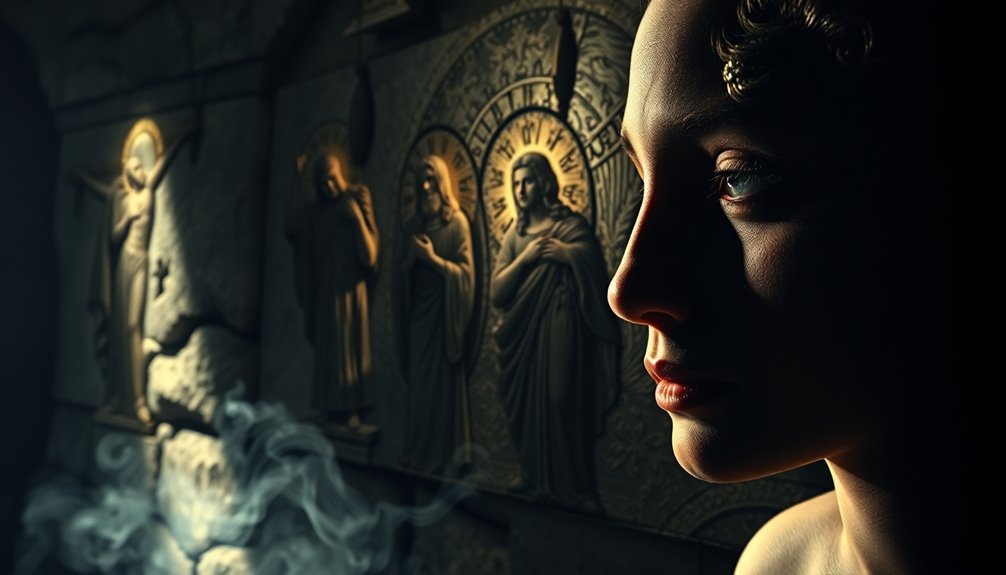Jesus' life is marked by pivotal events. He was born around 4-6 BC in Bethlehem and was circumcised, signifying his Jewish heritage. His public ministry began around 28 AD with his baptism by John the Baptist. After enduring temptation in the desert, he performed miracles and taught crowds. His final week included the Last Supper, crucifixion, and resurrection, which revitalized hope and established Christianity. Discover more about these transformative moments that shaped his legacy.
Major events in Jesus' life shape not only his story but also the foundation of Christianity. You can trace these pivotal moments back to his humble beginnings. Born around 4-6 BC in Bethlehem, the birth of Jesus marked the start of a transformative journey. His circumcision on the eighth day signified his Jewish heritage and a special covenant with God.
Fast forward to when Jesus was twelve years old; he astounded religious teachers in the Temple during Passover, demonstrating a profound understanding of spiritual matters. This moment stands out as the only recorded childhood event in the Gospels, hinting at the significant role he'd play in religious history.
When Jesus reached adulthood, he began his public ministry around 28 AD. His journey took a crucial turn during his baptism by John the Baptist, where a voice from heaven proclaimed him the beloved Son. This event set the stage for the subsequent trials he faced, including 40 days of temptation in the desert.
His ministry was marked by numerous events, including teachings, miracles, and gatherings around the Sea of Galilee, where he inspired many with his message of love and forgiveness.
The final week of Jesus' life is rich with profound events that echo through time. His triumphal entry into Jerusalem set the tone for what was to come, as crowds hailed him as the Messiah. That week, he shared the Last Supper with his disciples, establishing a lasting tradition for Christians.
In the Garden of Gethsemane, he prayed fervently, seeking strength for the trials ahead. His crucifixion on Good Friday was a harrowing moment that left his followers devastated, but it was also essential for the redemption narrative.
After his burial, the resurrection of Jesus on Easter Sunday revitalized hope among his disciples and followers. For six weeks, he appeared to over 500 people, affirming his teachings and reassuring them of his presence.
Finally, he ascended to heaven from the Mount of Olives, marking the conclusion of his earthly ministry. These events not only shaped Jesus' life but also established a faith that continues to influence billions.
Frequently Asked Questions
What Are the Major Events in Jesus' Life Timeline?
When you explore the major events in Jesus' life, you'll see a remarkable journey.
It starts with his birth in Bethlehem and includes his early wisdom in the Temple.
His public ministry kicks off with baptism by John the Baptist, leading to significant moments like the Last Supper and the Triumphal Entry.
You can't miss the crucifixion, followed by his resurrection, and finally, his ascension to heaven, promising to return.
What Are the 4 Stages of Jesus Life?
Imagine a journey through time, tracing the steps of a profound figure.
Jesus' life unfolds in four stages.
First, you witness the Preparatory Period, filled with his humble beginnings.
Next, the Period of Popular Favor showcases his teachings and miracles.
Then, you enter the Period of Opposition, where challenges arise from leaders.
Finally, the Final Week grips you with tension, leading to his crucifixion and the transformative Resurrection that follows.
What Significant Events Happened When Jesus Was Born?
When Jesus was born, several significant events unfolded.
You'd find Mary and Joseph in Bethlehem, where they'd to settle in a stable due to crowded inns. An angel announced His birth to nearby shepherds, inviting them to witness this humble beginning.
Later, wise men traveled from afar, bringing gifts of gold, frankincense, and myrrh, recognizing Jesus' importance.
These moments mark the beginning of a remarkable journey for the Son of God.
Which Two Important Events in Jesus' Time on Earth Followed His Death?
Did you know that over 2 billion people celebrate Easter worldwide?
After Jesus' death, two significant events followed: his resurrection and ascension. On the third day, his followers discovered the empty tomb, confirming his victory over death.
For forty days, Jesus appeared to his disciples, providing teachings that solidified their faith. Finally, he ascended into heaven from the Mount of Olives, marking the end of his earthly ministry and the promise of his return.
Conclusion
In reflecting on Jesus' life, it's amazing to realize that over 2.3 billion people around the world identify as Christians today, inspired by his teachings and sacrifice. This incredible statistic shows just how profound his impact has been throughout history. As you think about his journey—from humble beginnings to a legacy that transcends time—remember that his story continues to inspire hope and love in countless lives. Embrace that message as you navigate your own path.










